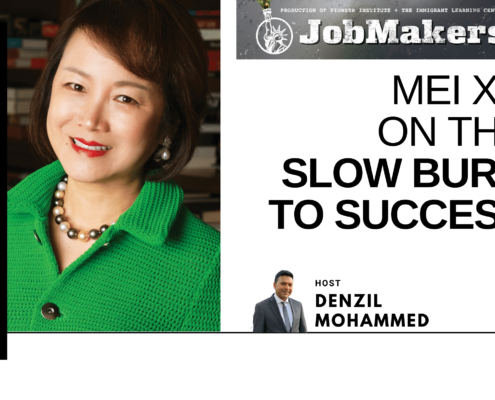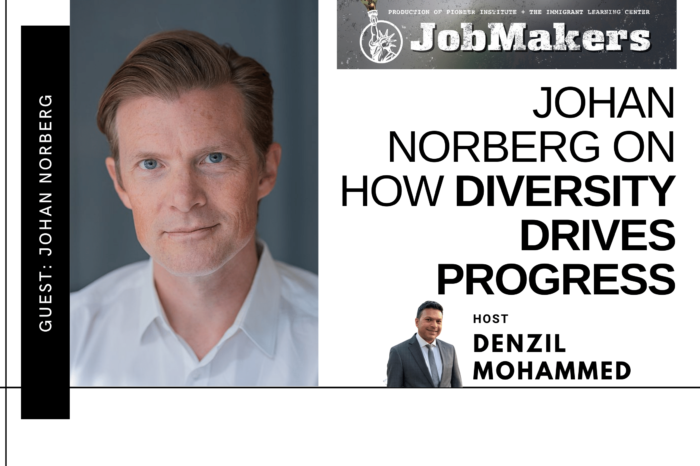Johan Norberg on How Diversity Drives Progress
/in Economic Opportunity, Featured, JobMakers /by Editorial StaffThis week on JobMakers, host Denzil Mohammed talks with Johan Norberg, senior fellow at the Cato Institute and author of Open: The Story of Human Progress. They discuss the many ways in which America is better off because it has been open to the exchange of ideas and skills that created cures, machinery, and technology. However, Norberg cautions that progress is limited as a result of the current obsession with “borders”: sovereign nations, state borders, and rules and regulations that differ even by neighborhood and restrict what we can do. If history is a guide, openness and diversity mean faster progress, innovation, and entrepreneurship. But, he warns, America is already losing ground – entrepreneurs and inventors are going elsewhere, as you’ll learn in this week’s JobMakers.
Guest
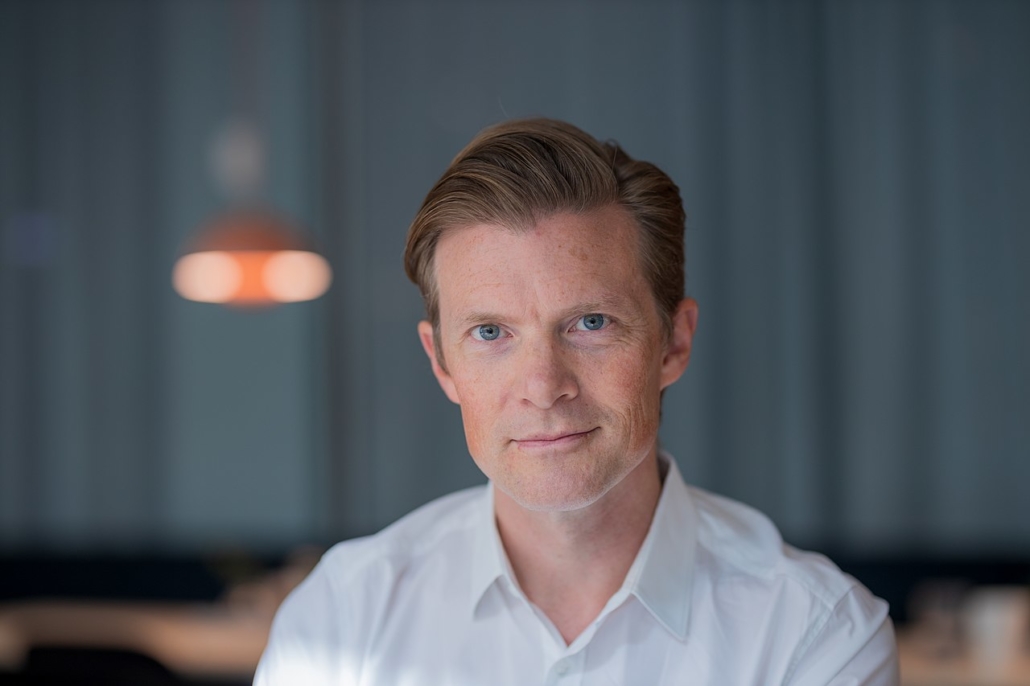 Johan Norberg is a senior fellow at the Cato Institute and a writer who focuses on globalization, entrepreneurship, and individual liberty. Norberg is the author and editor of several books exploring liberal themes, including Progress: Ten Reasons to Look Forward to the Future, named by The Economist as one of the best books of 2016; Financial Fiasco: How America’s Infatuation with Homeownership and Easy Money Created the Economic Crisis; and In Defense of Global Capitalism, originally published in Swedish in 2001 and since published in over 20 different countries. Norberg has also been the writer and host of numerous television documentaries on such subjects as globalization, India, energy, and Adam Smith. Many of them can be found at FreetoChoose.tv. Prior to joining Cato, Norberg was head of political ideas at Timbro, a Swedish free market think tank, from 2003 to 2005. He then served as a senior fellow for the Brussels-based Centre for a New Europe during 2006. Norberg received his master’s degree from Stockholm University in the history of ideas. His personal website is http://www.johannorberg.net/.
Johan Norberg is a senior fellow at the Cato Institute and a writer who focuses on globalization, entrepreneurship, and individual liberty. Norberg is the author and editor of several books exploring liberal themes, including Progress: Ten Reasons to Look Forward to the Future, named by The Economist as one of the best books of 2016; Financial Fiasco: How America’s Infatuation with Homeownership and Easy Money Created the Economic Crisis; and In Defense of Global Capitalism, originally published in Swedish in 2001 and since published in over 20 different countries. Norberg has also been the writer and host of numerous television documentaries on such subjects as globalization, India, energy, and Adam Smith. Many of them can be found at FreetoChoose.tv. Prior to joining Cato, Norberg was head of political ideas at Timbro, a Swedish free market think tank, from 2003 to 2005. He then served as a senior fellow for the Brussels-based Centre for a New Europe during 2006. Norberg received his master’s degree from Stockholm University in the history of ideas. His personal website is http://www.johannorberg.net/.
Get new episodes of JobMakers in your inbox!
Read a Transcript of This Episode
Please excuse typos.
Denzil Mohammed:
I’m Denzil Mohammed. And this is the first JobMakers podcast episode of 2022.
Denzil Mohammed:
The world seems pretty open, right? The internet, Netflix, telecommunication, travel, and we benefit daily from that openness. Let’s have Mexican for lunch. Let’s take a trip. Let’s watch the great British bakeoff. Ryan Reynolds, for heaven’s sake, he’s Canadian, but we’re also pretty closed in by borders, sovereign nations, state borders, rules, and regulations that differ even by neighborhood that restrict what we can do. For Johan Norberg, Senior Fellow at the Cato Institute, and author of “Open,” the story of human progress. The proof is all around us. If history is a guide, openness and diversity mean faster progress, innovation and entrepreneurship. After all, if not for immigration, there’d be no Coors beer. No TJ Maxx, no Carnival cruises. No COVID-19 vaccine. By almost every indicator, the world is better off because it was open to the exchange of ideas and skills that created cures, machinery and technology. However, Norberg says that with today’s obsession with borders, the United States is already losing ground, and entrepreneurs and inventors are going elsewhere. As you’ll learn in this week’s JobMakers. Johan Norberg, thank you for joining us on the JobMakers podcast. How are you?
Johan Norberg:
Thank you. I’m good. Thanks for having me.
Denzil Mohammed:
And you’re all the way across the world, in Sweden, aren’t you?
Johan Norberg:
Yes, that’s right, in dark, cold Sweden for the moment.
Denzil Mohammed:
Yeah. It’s getting dark and cold here as well. So we can share that. We are going to talk about your book, “Open,” the story of human progress. But I want to take it back a few years ago. In your previous book, Progress, of course, progress that word, again. 10 reasons to look forward to the future. You said when people are allowed freedom, they don’t create chaos, but progress. How does that happen in an increasingly diverse world and particularly in the context of the US?
Johan Norberg:
Well, first of all, the results are in and we have just had 30 years that, and this is not what we hear on the news, and this is not our everyday assumption, but 30 years that were the best 30 years in human history. When we look at objective indicators like the rise of health, wealth, the reduction in ancient scourges, like poverty and illiteracy, we lifted 150,000 people out of extreme poverty every day for 30 years. So apparently something is being done, right? And it, this is happening because of diversity. If we want to bring something new into the world, if we’re not content with the way things are, then we need innovation. We need new combinations, we need specialization and the ability to exchange with others, who’ve learned something else who come up with something else. They might have stumbled onto a new innovation or specialized in a certain way of production. And that takes diversity. If we’re all the same with similar knowledge, similar skills, we don’t get much new into the world. So it’s that mixture and remixture. That’s what creates this progress.
Denzil Mohammed:
And yet, you say this concept of, of longing for some distant past is really having a bad memory. And from what you’re saying, now, it appears as though we are somehow oblivious about the progress that we have made in the recent past. Nearly half of the United States voted twice to get back to some sort of great time or place or idea. Where does that kind of nostalgia or some might say, delusion, you might say delusion, where does that really come from?
Johan Norberg:
Actually comes from ourselves. It comes from human nature. I also happen to think that all the good music that exists in the world was created in the 1980s and everything since then has been awful. When I talk to audiences around the world, I often ask them, so think about this. When was the world at its most harmonious? When did we lead good lives? And, and in harmony with one another, and most people end up with saying the era in which they grew up. So people who grew up in the fifties think it’s the fifties. People who grew up in the eighties, think it’s the eighties. Those who grew up now, believe it or not, they are gonna look back on this day and age as the, the golden era. And I think that’s basic psychology. I think it’s when you grow up, there’s this sense of the world as an adventure, but at the same time, it feels safe and secure because your parents are there to hopefully pick up your problems and your bills.
Johan Norberg:
But then you grow older and you have kids and you have to start worrying about everything that goes wrong and you learn about the world and everything then seems dangerous and scary because we still don’t have solutions to most of the problems that we’re obsessed with today. And we forget that every era faced the same difficulties and didn’t have the solutions that we now think of as, oh, that’s simple. Back then. So I think its psychology is very easy to deceive us that look, something is wrong today, for demagogues to tell you that, look, isn’t the world a scary place? Let’s go back to something safe that we had, and that is dangerous. And that’s why we need history and economics, and data, hard data points and statistics to really tell us how the world is really doing.
Denzil Mohammed:
I was just about to ask how come we are so oblivious to the progress that we’ve made. And you talk about demagogues who want to take us back to some place that feels safe, right? Expand on this for me – why are we so oblivious to the progress that we’ve made and the reasons for that progress?
Johan Norberg:
Because problems solved are problems forgotten. We don’t think about the problem of smallpox and polio and soon, hopefully we’ll stop thinking about HIV AIDS. But we are thinking that the world is going to the dogs because of COVID-19 and the pandemic for simple and understandable reasons. We pay all our attention to the problems at hand because they are the ones that we have to solve. And then obviously demagogues and politicians, they don’t activate you by saying, look, things are pretty good, right? <Laugh> so vote for me. If you don’t care, that doesn’t work. They have to tell you something is worrying. People are, we have disloyal elites and strangers trying to tear everything down, but you need me basically. And the media obviously has an interest in scaring us, shocking us because then we have to turn to the news. Nobody pays attention to flights that landed safely. But if there’s a plane crash, obviously that makes the news
Denzil Mohammed:
Talk about this further in the context of immigration.
Johan Norberg:
That’s very interesting because we can see exactly the same kind of development there. When you go back and look at waves of migration to different places. The first reaction people have is often, I mean, there might be a need socially, economically for the migrant, but it’s also scary new people from another culture we don’t know, are they going to integrate or not? And it looks scary. So, I mean, in the United States when you’ve got strangers like Swedes over there in the mid 19th century and Germans, even people who liked migration and immigration like Thomas Jefferson and Benjamin Franklin said, this is a little bit worrying because they come from non-democratic societies, and will they ever be able to integrate? And then obviously it didn’t take long until the Swedes and Germans were seen as the ideal model of what an immigrant should be like, especially compared to the dangerous Catholics who are coming now, the Italians and the, the Irish, because they’re dangerous, they’re criminals, and they have another faith, they’re loyal to Rome and the Pope. So they will never be integrated. And obviously it didn’t take long before they got integrated and sort of started working, building families. And people said, oh, they are great. But look at the next wave, the Chinese or something like that. And we repeat the same thing over and over again. The latest wave of migrants are always scary, especially compared to previous ones. Cause we’ve already learned of them. We’ve met them and we know that they didn’t tear our society down. They made it stronger.
Denzil Mohammed:
You start your newest book, Open: the Story of Human Progress, with the time that then-President Trump scribbled in the margins of a speech he was about to give, “trade is bad.” Yet you go on to argue very vividly that trade is basically indispensable to human life. It’s part of society. It’s part of civilization. Why were those three words so appealing to so many Americans?
Johan Norberg:
Yes, that is really the thing we’ve got to think about and try to understand because trade is so incredibly important. It’s the reason why mankind conquered the planet because people, homo sapiens, learned early on how to cooperate with strangers and find mutual gains. And, therefore, the moment somebody stumbles onto a way of controlling fire or inventing the wheel, we could all learn from it or how to go into space or read the genome of a new virus and come up with a vaccine. That’s what makes us strong, the ability to exchange and trade. But the reason why so many people believe what Trump says, that trade is bad and dangerous, is that people often think that the economy is zero-sum. They think that if somebody else is gaining from this transaction with us, then we must be the losers.
Johan Norberg:
So it’s always something that leaves us exposed to outsiders. And that always looks bad. And obviously this is just a myth. The reason why we’ve gotten so strong and rich as we are, is specialization and trade, but it doesn’t feel like it, especially if the others are seeing more rapid growth than we do, then you begin to think, oh, it’s the Mexicans and the Chinese, they are the ones gaining. It would be better if we concentrated production back home and, and avoided trade. But if that were the case with national borders, well, why wouldn’t that be the case with city borders? Why should Manhattan buy from, even from Brooklyn? Shouldn’t we be safer if we kept everything in Manhattan, you can turn your abilities and your hard work into the other things that you need.
Johan Norberg:
So basically the more access you have to such a machine, the better off you are. What Trump and many protectionists are saying, is that, look, why do you produce iPhones in China? Wouldn’t it be better if we produce them back home? And in that case, we’d get all the rewards rather than giving some of them to the Chinese. And that’s a misunderstanding of how specialization works, because when you leave some of the routine manufacturing to another place, yes, it’s good for them because they get jobs and they get revenue. But it also means you can specialize more of your workforce in more productive areas. So more people who do the design and the programming and the marketing and the distribution. So if you look at a cell phone, an iPhone in, in your shop, you see how much is going to the Chinese.
Johan Norberg:
Well, around a little bit more than 1% of the price you pay for your iPhone goes to the Chinese. It’s not like they get all of it. Most of it go to American workers and to Apple and to the tax authorities. And that’s what specialization does. If you had to do all of those things back home in the us, well, then you would have to pay much more for that simple manufacturing, which means that many would buy a Huawei phone or something like that from China instead. And it would mean that you’d have to have much more production back home. So it’s a twin loss.
Denzil Mohammed:
In your book “Open,” you say that your argument is that under open institutions, people will solve more problems than they create no matter their personality traits. And it’ll increase the chance that the paths of people with different traits cross and that their thoughts and work can cross fertilize. You say that this will happen. How do you know that this is certain going forward?
Johan Norberg:
Well, I hope I don’t disappoint you if I admit that I’m not certain that this will go forward, because it depends on our choices. And it depends on politics. What I’m saying is that if we have open institutions, if we allow our societies to open, to surprises, to people coming up with new things and being free to exchange, this will get great innovations and discoveries and and wealth production. It’s not just history and the study of human creativity. It’s mathematics, you know as they say in programming with a sufficient number of eyeballs looking at code, every bug is shallow because someone is bound to see the problem and fix it. Well, it’s the same thing with the world. The more eyeballs that are directed to our problems whatever they are, the greater the chance they will come up with solutions to it.
Johan Norberg:
But at the same time, we live in an era where people are afraid of this kind of openness, where we have lots, plenty of demagogues telling us that no, it’s safe to hide behind walls, behind tariff barriers. And once in a while they do succeed and they might be able to turn inwards. And in that case, we won’t see as much of dynamic societies and innovation, we’ll be weaker for it. So it’s not automatic that this happens. And that’s, by the way, why I write my books. If it was, I could go and do something else instead but it’s necessary. It has to happen. We have to keep our institutions, our countries, our world open to continue to make progress.
Denzil Mohammed:
And I think of the example of Moderna, which came up with one of the first vaccines, and Derrick Rossi, immigrant from Canada, Noubar Afeyan, and Kenneth Chien, it’s all these different people from all these different places who came together to found this company. Pfizer, the same thing, immigrant co-founders. We see it, you know, it’s there in the headlines every day, this kind of innovation that is drawn as you say, different eyeballs coming from a different place, right?
Johan Norberg:
And, even more, the reason why Pfizer could do it was that they cooperated with Biontech in Germany, and they were founded by and are led by two immigrants and descendants of immigrants from Turkey.
Denzil Mohammed:
It always astounds me that this nation was built by immigrants, people who fled other places who had some sort of desire to succeed and to live and to thrive that they couldn’t have done in their homeland. It’s much the same today with immigrants who are coming that, that inherent, I would call it an entrepreneurial spirit that often leads to them starting businesses at twice the rate of the US born. But one of the reasons that that Americans are turned off by immigration as an issue is the chaos that they see. And you mentioned the media and demagogues earlier on blowing up certain things about immigration. And that includes the Southern border, where we have these camp sites of immigrants from south America, central America, Haiti, different places speak a little bit to that idea of the border actually causing that chaos vis a vis your concept of openness.
Johan Norberg:
Yes. There is a reason why nativists and anti-immigration groups always try to show us vivid imagery of waves of migrants, not individuals, but it looks like chaos and just large groups, because we dislike chaos and groups approaching it triggers this tribalist mentality, and it is scary to us. And we want to do anything to just shut it down. So we can often see that in Europe we’ve seen how far right groups, they use imagery that they find in the other side of the continent of something that looks like chaos and tells us this is happening here, because immediately we react with our reptilian brains. The problem of course, is that this is something that you create with borders. That’s not how people act. If people are go for employment or moving to a place where they find better options moving into a new apartment, it’s not chaos.
Johan Norberg:
It’s not anything like that. If you look at this on an individual level, but when you suddenly impose a border blocking people from doing it, obviously people are bound on to end up there and trying to do anything to get in. If that’s the only option, if there are no legal simple official means to do that. If you did the same thing in Manhattan, just imposed a border across the whole island, obviously people would concentrate right by that border trying to get over because that’s the only way to meet with others, with friends and relatives, and do business and move to a place that might be more giving more option to, to you in your life. And that would look like chaos as well, but that’s not what Manhattan looks like when it’s open, when you can easily cross from one end to the other.
Denzil Mohammed:
Even during the pandemic, you know, foreign-born healthcare workers who could have moved to different states that were experiencing, you know, overcrowding of ICUs and things like that, but because of state restrictions or federal restrictions, they could not do that. And I even think of, of probably the most mobile workforce in the US, which is undocumented immigrants. They can, you know, it’s almost like an underground railroad to move to states where they need meat packing workers, or poultry workers, or agricultural workers, fracking workers and the idea of them being able to move to these places, to fill those gaps. We don’t even recognize that. So therefore, ultimately, how do you think individuals could adopt a more open mindset in their day to day lives?
Johan Norberg:
Rather than looking for the science of how somebody’s different, we can override it and learn that well, it’s the differences that can teach us something new and gives us new opportunities, but also realizing that if somebody else is a human being, it means that there are other circles of identity, personality traits, tribe. If you want to use that word that you have in common with them, yeah. They might be foreigners. They might be Norwegians, but he’s also a father. He might also be interested in history. He might be cheering for the same English team in soccer. He might be listening to electronic music. You can always find those different commonalities between yourself and other individuals. If you look hard enough, if you don’t think of people as belonging, just one group. And that I think is the beauty of a more open and individualistic world to realize that we, we don’t just have one kind of identity we’re made up of multitudes of allegiance.
Denzil Mohammed:
No, no Johan, I think that’s too much work for the average person. <Laugh>
Johan Norberg:
Could be.
Denzil Mohammed:
Your book “Open: The Story of Human Progress,” is available for sale. Thank you very much, Johan Norberg, for joining us on the JobMakers podcast.
Johan Norberg:
Thank you so much, Denzil, this was a pleasure
Denzil Mohammed:
Jobmakers is a weekly podcast about immigrant entrepreneurship and contribution produced by Pioneer Institute, a think tank in Boston and the Immigrant Learning Center in Malden, Massachusetts, a not for profit that gives immigrants a voice. Thanks for joining us for today’s fascinating conversation on how immigration enriches our entrepreneurial and innovation ecosystems. Got comments? Know someone we should talk to? Email Denzil, that’s D E N Z I L @ jobmakerspodcast.org. Please leave us a review. I’m Denzil Mohammed. Join us next week at noon for another episode of JobMakers.
Recent Episodes:
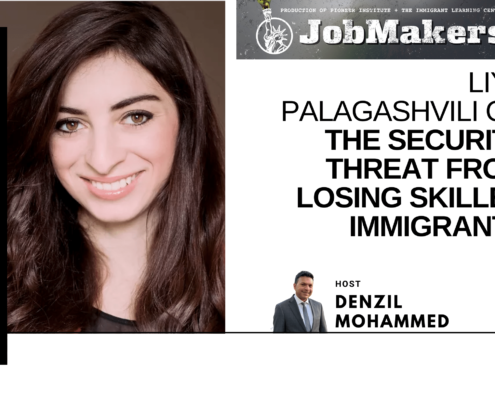
Liya Palagashvili on the Security Threat from Losing Skilled Immigrants
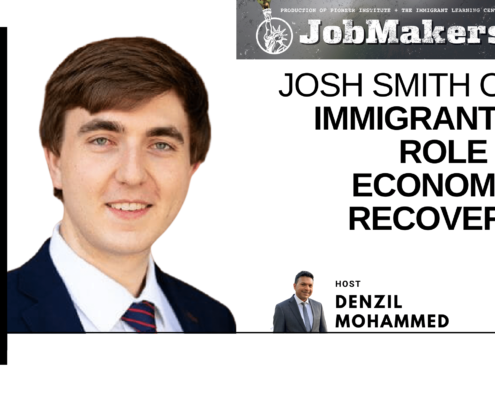
Josh Smith on Immigrants’ Role in Economic Recovery
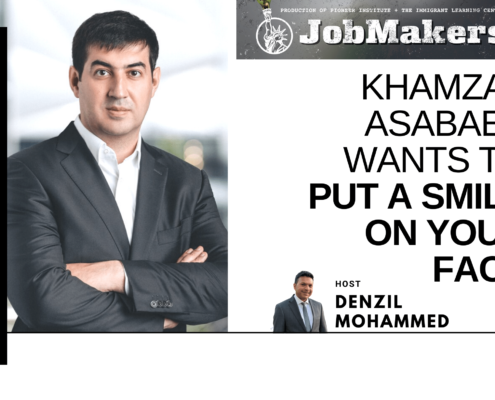
Khamzat Asabaev Wants to Put a Smile on Your Face

April Ryan Paints Her Way to Success
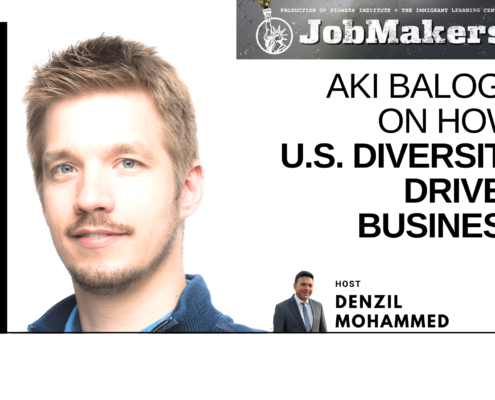
Aki Balogh on How U.S. Diversity Drives Business
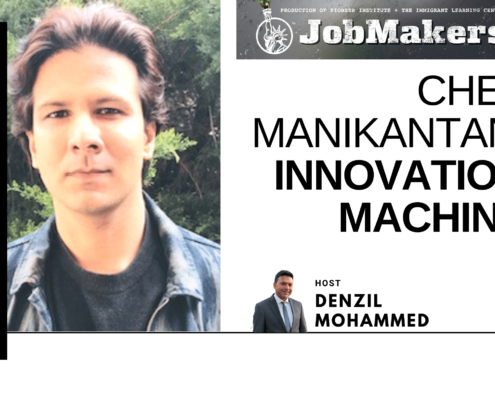
Chet Manikantan: Innovation Machine
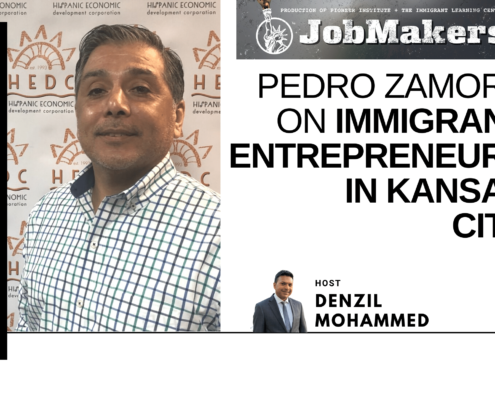
Pedro Zamora on Immigrant Entrepreneurs in Kansas City
